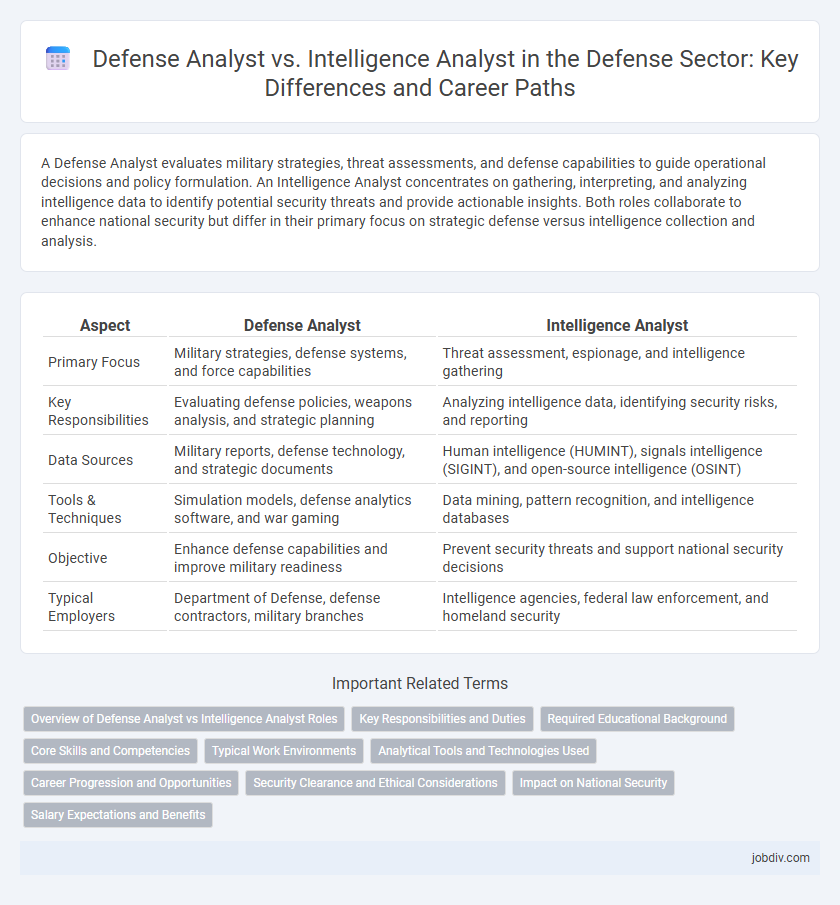A Defense Analyst evaluates military strategies, threat assessments, and defense capabilities to guide operational decisions and policy formulation. An Intelligence Analyst concentrates on gathering, interpreting, and analyzing intelligence data to identify potential security threats and provide actionable insights. Both roles collaborate to enhance national security but differ in their primary focus on strategic defense versus intelligence collection and analysis.
Table of Comparison
| Aspect | Defense Analyst | Intelligence Analyst |
|---|---|---|
| Primary Focus | Military strategies, defense systems, and force capabilities | Threat assessment, espionage, and intelligence gathering |
| Key Responsibilities | Evaluating defense policies, weapons analysis, and strategic planning | Analyzing intelligence data, identifying security risks, and reporting |
| Data Sources | Military reports, defense technology, and strategic documents | Human intelligence (HUMINT), signals intelligence (SIGINT), and open-source intelligence (OSINT) |
| Tools & Techniques | Simulation models, defense analytics software, and war gaming | Data mining, pattern recognition, and intelligence databases |
| Objective | Enhance defense capabilities and improve military readiness | Prevent security threats and support national security decisions |
| Typical Employers | Department of Defense, defense contractors, military branches | Intelligence agencies, federal law enforcement, and homeland security |
Overview of Defense Analyst vs Intelligence Analyst Roles
Defense analysts evaluate military strategies, technologies, and defense systems to enhance national security and support military operations. Intelligence analysts gather, interpret, and assess intelligence data to identify threats, predict adversary actions, and inform decision-making processes. Both roles demand strong analytical skills but differ in focus: defense analysts concentrate on defense capabilities and policy, while intelligence analysts specialize in threat assessment and intelligence exploitation.
Key Responsibilities and Duties
Defense Analysts evaluate military capabilities, threat assessments, and strategic defense policies to support national security objectives. Intelligence Analysts collect, analyze, and interpret classified information to identify potential threats and provide actionable intelligence to military and government agencies. Both roles require expertise in data analysis, critical thinking, and knowledge of defense systems, but Defense Analysts focus more on broad strategic planning while Intelligence Analysts prioritize tactical intelligence gathering and dissemination.
Required Educational Background
A Defense Analyst typically requires a background in military science, defense studies, or security policy, often holding degrees related to strategic studies or international relations. An Intelligence Analyst frequently needs expertise in intelligence analysis, political science, or cybersecurity, with specialized training in data interpretation and threat assessment. Both roles benefit from advanced degrees, such as a master's in defense analysis or intelligence studies, combined with practical experience in government or military agencies.
Core Skills and Competencies
Defense analysts excel in strategic assessment, threat evaluation, and military capability analysis, emphasizing operational planning and force readiness. Intelligence analysts specialize in data collection, signal interpretation, and threat identification, focusing on raw intelligence exploitation and real-time situational awareness. Both roles require critical thinking, attention to detail, and proficiency in classified information handling within defense and security frameworks.
Typical Work Environments
Defense analysts typically work within military bases, defense contractors, or government agencies analyzing strategic operations and defense systems. Intelligence analysts often operate in intelligence agencies, law enforcement offices, or national security organizations, focusing on gathering and interpreting intelligence data to support security decisions. Both roles require secure, high-confidentiality environments that facilitate access to classified information and collaboration with defense or intelligence personnel.
Analytical Tools and Technologies Used
Defense Analysts primarily utilize geospatial intelligence software, threat assessment models, and military simulation tools to evaluate battlefield scenarios and strategic defense postures. Intelligence Analysts rely heavily on data mining algorithms, signal interception technologies, and advanced machine learning platforms to interpret classified communications and predict adversary movements. Both roles leverage big data analytics and cybersecurity frameworks to enhance national security decision-making processes.
Career Progression and Opportunities
Defense analysts typically advance through ranks by gaining expertise in military technology, strategic planning, and risk assessment, often transitioning into roles such as senior defense consultant or policy advisor. Intelligence analysts focus on collecting and interpreting information related to national security threats, progressing toward positions like counterintelligence officer or intelligence operations manager. Both careers offer opportunities in government agencies, defense contractors, and international security organizations, with career growth influenced by specialization in cyber intelligence, geopolitical analysis, or counterterrorism.
Security Clearance and Ethical Considerations
Defense analysts typically require higher-level security clearances such as Top Secret or SCI due to their involvement in assessing military capabilities and strategic defense plans, whereas intelligence analysts often hold similar clearances but focus on gathering and interpreting classified information related to national security threats. Both roles demand strict adherence to ethical guidelines, including the responsible handling of sensitive data and maintaining confidentiality to protect national security interests. Ethical considerations also encompass avoiding conflicts of interest and ensuring the accuracy and objectivity of analyses provided to decision-makers.
Impact on National Security
Defense analysts evaluate military capabilities, defense strategies, and threat assessments to inform policy decisions, directly influencing national security preparedness and resource allocation. Intelligence analysts process and interpret classified data from multiple sources to identify potential threats, enabling timely countermeasures against espionage, terrorism, and cyber-attacks. Both roles are critical; defense analysts shape strategic defense initiatives, while intelligence analysts provide actionable insights to prevent security breaches and safeguard national interests.
Salary Expectations and Benefits
Defense analysts typically command higher salary expectations than intelligence analysts due to their specialized expertise in military strategy and defense systems. Benefits for defense analysts often include comprehensive health insurance, retirement plans, and opportunities for security clearance bonuses, while intelligence analysts may receive additional benefits such as access to classified information resources and advanced analytical training programs. Both roles offer competitive compensation packages, but defense analysts generally experience greater earning potential linked to direct support of defense procurement and operational planning.
Defense Analyst vs Intelligence Analyst Infographic

 jobdiv.com
jobdiv.com